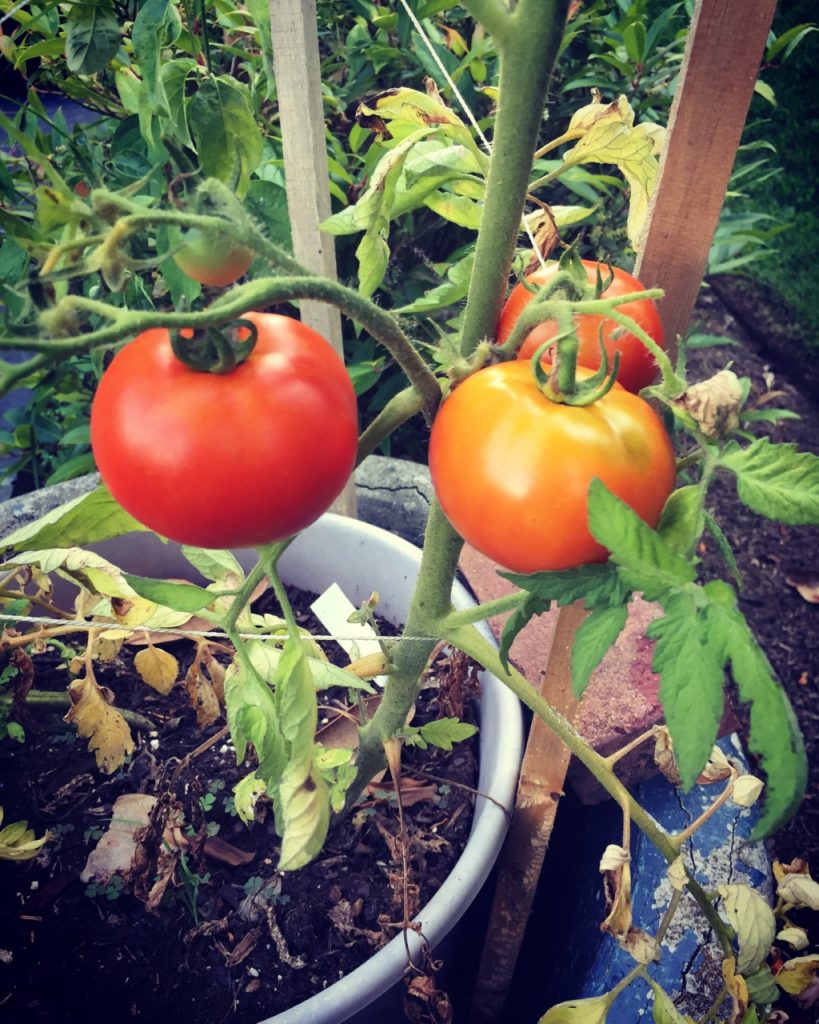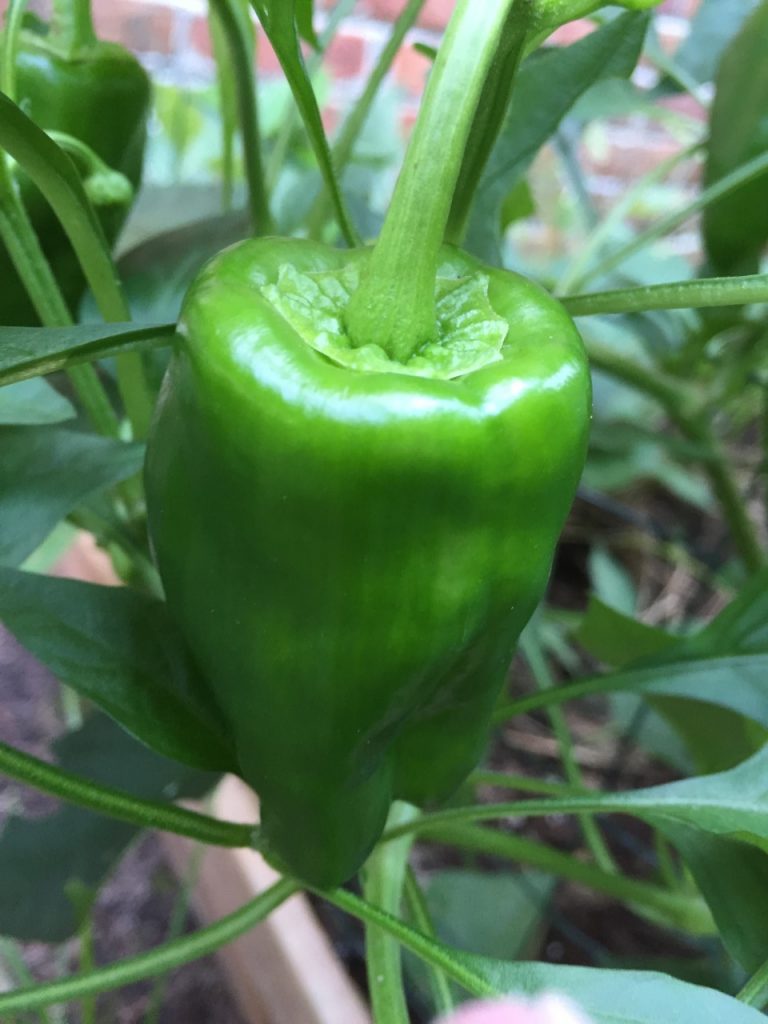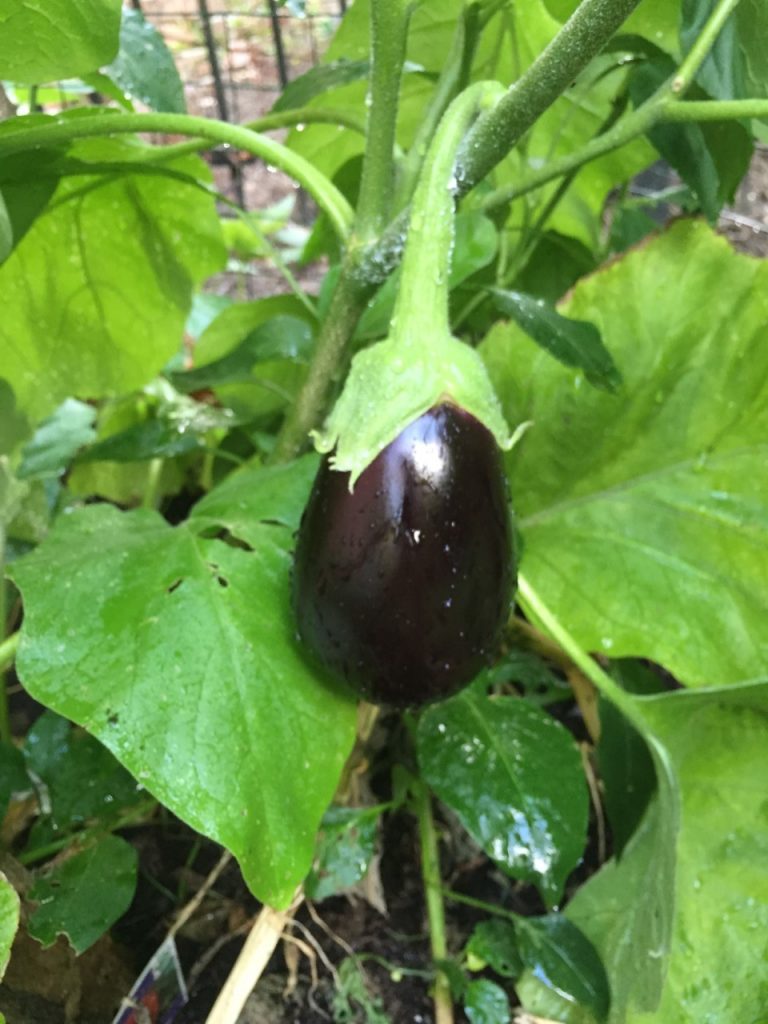This summer, I started a small garden in my backyard.  After building a raised bed and planting small seedlings, I anxiously (and impatiently) waited to see signs of growth. I planted red bell peppers, summer squash, zucchini, eggplant, and green beans. Every afternoon, I watered and weeded the bed until one day in July, I began to see some new developments. A small bell pepper was beginning to form on one of the plants! Gardening became a relaxing, outdoor activity that I could turn to after spending eight hours in an office for my summer internship. Gradually, my family became more involved and they would help me water, harvest the crops of vegetables, and cook delicious summer foods with them. It was an activity that brought my family together over a mutual interest in gardening, an investment in seeing the vegetables grow, and a mutual love of food. When I left to go back to Bryn Mawr College, my parents took over caring for the garden and sent me frequent updates.
After building a raised bed and planting small seedlings, I anxiously (and impatiently) waited to see signs of growth. I planted red bell peppers, summer squash, zucchini, eggplant, and green beans. Every afternoon, I watered and weeded the bed until one day in July, I began to see some new developments. A small bell pepper was beginning to form on one of the plants! Gardening became a relaxing, outdoor activity that I could turn to after spending eight hours in an office for my summer internship. Gradually, my family became more involved and they would help me water, harvest the crops of vegetables, and cook delicious summer foods with them. It was an activity that brought my family together over a mutual interest in gardening, an investment in seeing the vegetables grow, and a mutual love of food. When I left to go back to Bryn Mawr College, my parents took over caring for the garden and sent me frequent updates.
Back at school, I noticed a plot of land next to one of our dining  halls. After doing a little research, I found out that it was a community garden entirely run by students. I reached out to Ankitha Kannad, one of the student co-heads of the garden, and met with her to hear a little bit more about it. She explained how the community garden brings students, faculty, and staff together not only to garden, but also to learn more about the ways in which sustainable farming effects the larger community. As an international student from Singapore Ankitha attended school in India. After high school, she got involved in environmental movements during a gap year she took before attending Bryn Mawr. In Singapore, she grew up in an open environment and heard stories about her family’s gardens in the countryside. These experiences, as well as her newly cultivated interest in the environment, motivated her to join the community garden at Bryn Mawr and learn more about sustainable farming.
halls. After doing a little research, I found out that it was a community garden entirely run by students. I reached out to Ankitha Kannad, one of the student co-heads of the garden, and met with her to hear a little bit more about it. She explained how the community garden brings students, faculty, and staff together not only to garden, but also to learn more about the ways in which sustainable farming effects the larger community. As an international student from Singapore Ankitha attended school in India. After high school, she got involved in environmental movements during a gap year she took before attending Bryn Mawr. In Singapore, she grew up in an open environment and heard stories about her family’s gardens in the countryside. These experiences, as well as her newly cultivated interest in the environment, motivated her to join the community garden at Bryn Mawr and learn more about sustainable farming.
Ankitha organizes the gardening club at Bryn Mawr so that  students and faculty can garden weekly and pick ripe produce throughout the week. The harvested produce is donated to a local food pantry and is also used in the dining halls on campus. The crops grown include lettuce, kale, carrots, tomatoes, and watermelon. Not only is the garden a form of stress relief, but it also brings together the Bryn Mawr community as faculty, staff, and students can all participate, reap the benefits, and meet people they would not normally meet. Ankitha mentioned that her favorite aspect of the community garden is watching the plants grow with simple ingredients like water and sunlight. She also enjoys the rewarding feeling of using completely organic methods grow fresh produce.
students and faculty can garden weekly and pick ripe produce throughout the week. The harvested produce is donated to a local food pantry and is also used in the dining halls on campus. The crops grown include lettuce, kale, carrots, tomatoes, and watermelon. Not only is the garden a form of stress relief, but it also brings together the Bryn Mawr community as faculty, staff, and students can all participate, reap the benefits, and meet people they would not normally meet. Ankitha mentioned that her favorite aspect of the community garden is watching the plants grow with simple ingredients like water and sunlight. She also enjoys the rewarding feeling of using completely organic methods grow fresh produce.
From the family unit to community level production, sustainable farming has become an increasingly popular form of agriculture. Not only is it relaxing and rewarding, as shown in my small backyard garden and in the Bryn Mawr community garden, but it is also the primary source of food for many communities across the world. In Wayanad India, Profugo staff work with local farmers to ensure that agriculture remains chemical and pesticide-free. In addition to implementing composting techniques and organic farming methods, the Profugo team uses rainwater tanks to collect and recycle rain water for agriculture. Through these practices, residents of Wayanad can grow their own food in a sustainable manner without fear of polluting drinking water sources. Whether a family activity or a larger scale venture, sustainable agriculture brings together diverse communities under common goals, interests, and needs.
To support Profugo’s Sustainable Agriculture Program, go here.

Leave a Reply
You must be logged in to post a comment.